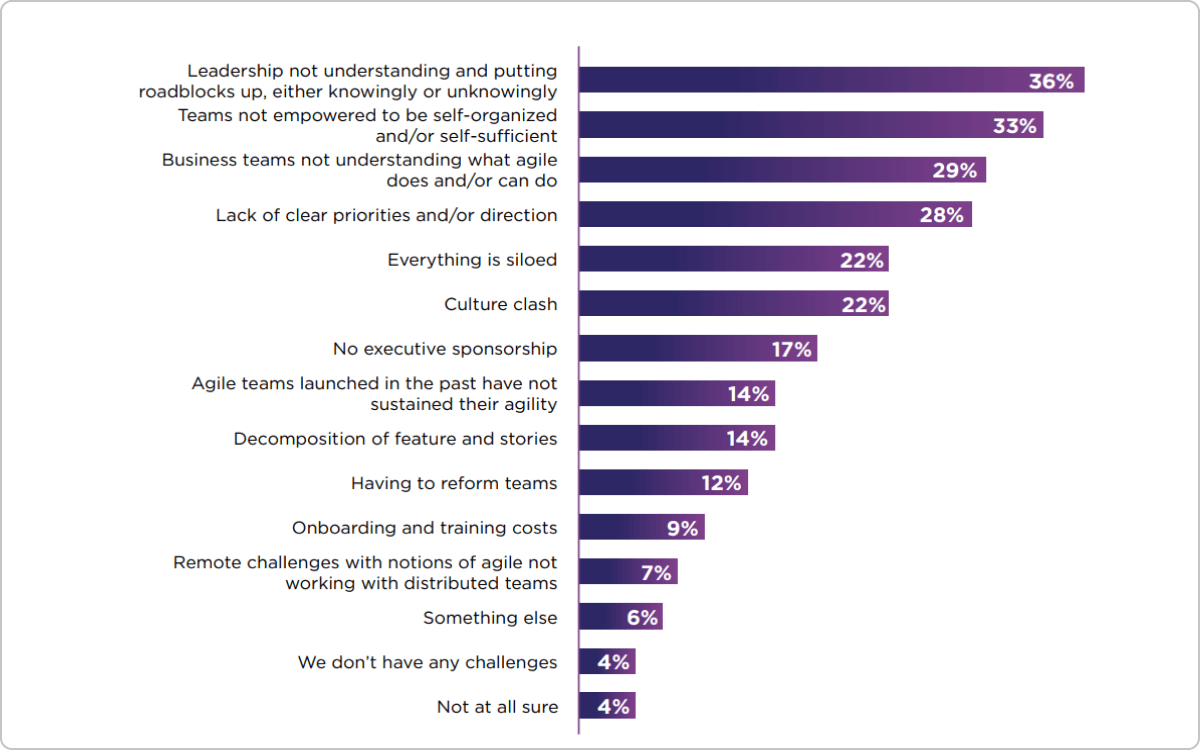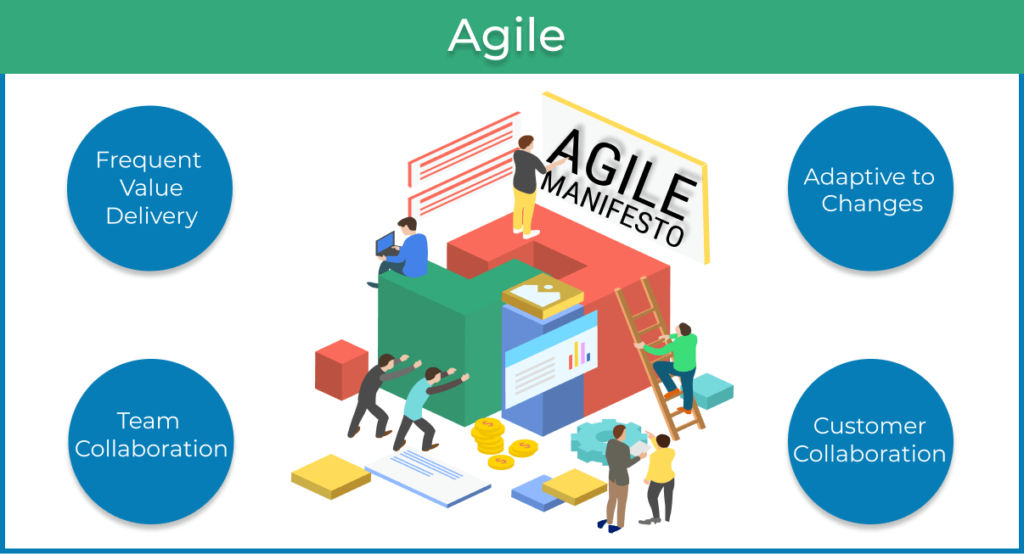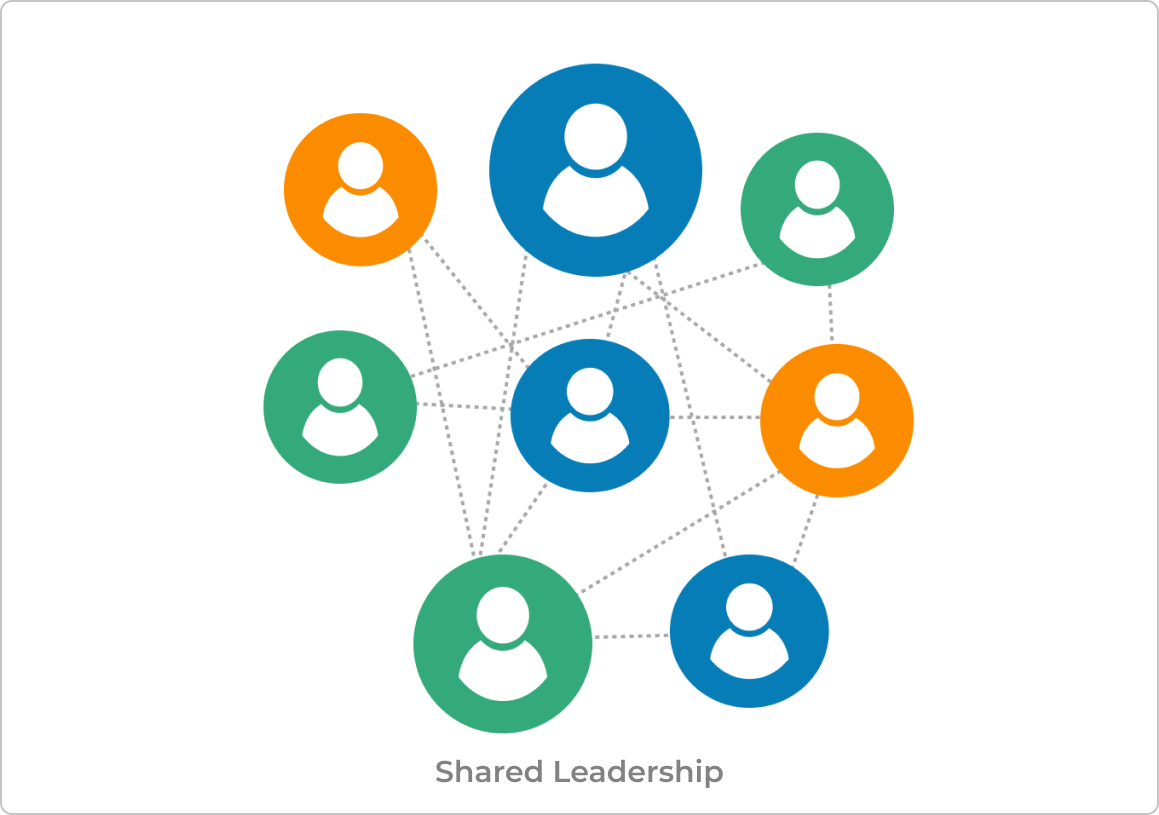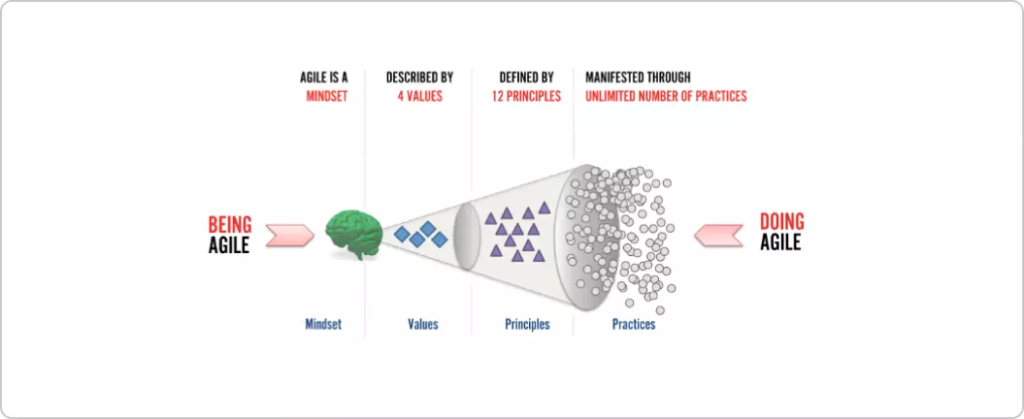An Agile project manager is a key figure in the operation of an Agile team. Usually, those are people with excellent knowledge of Agile values and practices and a strong background in managing projects in an Agile way.
They are primarily in charge of overseeing the entire project lifecycle, including defining project scope, identifying potential risks, and keeping track of successfully delivered projects.
Besides that, an Agile PM is engaged in regular discussions to get external and internal feedback. This allows them to be up to date with the changing business and client's needs and, thus, guide their teams to adapt and respond to these needs.
What Are the Agile Project Manager's Responsibilities?
Instead of controlling the playing field from a high-level position, Agile project managers practice horizontal management and constantly seek both internal and external feedback. This way, they can react adequately to emerging changes or issues in a timely manner.
Let's look at the key responsibilities of Agile project managers.
- Facilitating discussions to improve collaboration across the organization. Whether they need to plan work, resolve process roadblocks, understand the pace of the work's progress, or the talents of their team members, Agile project managers are constantly engaging in discussions. The ability to facilitate such discussions using various feedback opportunities is a critical asset of the Agile project manager. Productive feedback is important to establishing cross-functional teams and a key prerequisite for success in Agile teams.
- Empowering team members to self-organize around their work. PMs in Agile turn into top leaders who lead by example and empower their teams to self-organize their work, considering their strengths and interests. By doing so, they manage to not only maximize the potential of their team but also to shift the focus to optimize the value delivery process rather than individual performance.
- Supporting Agile transformation efforts through coaching and training. Project managers play a significant role in ensuring the success of every Agile transformation by advocating the principles and values of Agile management. Inconsistency in Agile practices across teams adopting the Agile mindset is still identified as a leading cause of failure to adhere to the Agile ways. In this regard, project managers are responsible for teaching and supporting their teams to understand the reasoning for collaboration, shared leadership, self-organization, and flexibility on their path to true organizational agility.
 Challenges when adopting and scaling Agile practices according to the 17th Annual State of Agile Report
Challenges when adopting and scaling Agile practices according to the 17th Annual State of Agile Report
What Are the Key Skills of Successful Agile Project Managers?
Agile project managers develop certain qualities and skillsets to ensure that they fulfill their responsibilities at all times. Here is a short list of the qualities that a project manager should have to be successful in an Agile environment:
- Understanding the big picture and prioritizing work based on high-level goals.
- Emotional intelligence and active listening.
- Excellent communication within and across hierarchies.
- The ability to identify and analyze potential risks.
- Conflicts resolution through adaptive leadership.
- The ability to continuously improve the processes.
- Ability to motivate and mentor individuals and teams.
- Strong familiarity with the Agile mindset, principles, values, and methodologies.
What Is the Role of the Agile Project Manager?
An Agile PM performs many different functions, such as being a leader, mentor, or coordinator.
Establishing an Agile environment: Agile project managers’ central role is to create a productive and result-oriented working environment where people are open to sharing ideas and opinions.
Promoting team collaboration: Agile PMs are focused on promoting self-organizing teams, transparency, and shared ownership of the work process, as well as increased team collaboration.
Has the Project Manager Role Become Redundant?
Understanding better the role of an Agile PM, if we also take a look at the Agile manifesto and its values and principles, we may quickly conclude that the project manager role becomes redundant. However, is this really the case? Let me explain.

Agile manifesto values
There is widespread confusion that when moving to Agile, project managers often should take up the role of a Scrum Master (if you are adopting Scrum). There are no prescribed roles in Kanban, however, many teams still choose to have a Service Delivery Manager and call them an Agile or Lean project manager. The thing is that those roles predominantly focus on the team level. In contrast, the project manager in Agile has allegiance to the higher organizational level too.
I believe that the confusion comes from the various interpretations of the project manager's role, and it's pretty much a question of complexity and scale. Especially if your organization is handling multiple projects, then the project managers are absolutely vital even in an Agile environment. They will act as coordinators and anchors between high-level requirements and work execution on the team-level.
Having said that, we can conclude that the project manager's role in Agile differs from the responsibilities of Service Delivery Managers, Scrum Masters, or any other roles in an Agile team.

Agile Project Managers vs. Traditional Project Managers
In traditional project management, PMs are responsible for distributing tasks across team members, defining the scope in extensive documentation, planning work activities with great detail, updating project status, etc. This is what usually depicts the conventional command and control work environment that I am sure most of you are familiar with.
In contrast, Agile project managers abandon the old command and control approach and put more focus on collaboration, agility, and adaptability. It is specific for them to embrace Agile planning, meaning they avoid heavy, upfront planning but instead develop and adjust the plan during the course of the work.
In addition, they rely on constant feedback, which allows them to frequently deliver small batches of work and remain flexible to the emerging requirements of their clients. Furthermore, they advocate the idea of self-organizing team members who are accountable for organizing and managing their tasks.
| Agile Project Manager | Traditional Project Manager |
|---|---|
| Emphasizes flexibility and adaptability. |
Focuses on detailed upfront planning. |
|
Scope can change based on feedback. |
Scope is defined early, and changes are minimized. |
|
Acts more as a facilitator and coach. |
Often follows a command-and-control leadership style. |
|
Continuous and close collaboration with stakeholders. |
Periodic updates and reviews with stakeholders. |
|
Risks are managed and adapted to continuously. |
Risks are identified and mitigated early in the process. |
Common Characteristics of Successful Agile Project Managers
In addition to all the duties an Agile PM must fulfill at any time, a true leader needs many layers of leadership and interpersonal skills for the success of the projects and efficient team performance.
Generally, it is expected that Agile project managers should be able to respond quickly to unexpected circumstances, think strategically to find the most prominent solutions to issues of any kind, have a clear vision of companies' objectives, be easy to communicate with and motivate people to give their best.
However, turning into a project manager in Agile is easier said than done. There are many organizations where Agile frameworks are in place. However, project managers still act in the way they are used to. That's why to thrive in an Agile environment, you need to first and foremost embrace the Agile mindset.
 The Agile mindset: image by Ahmed Sidky
The Agile mindset: image by Ahmed Sidky
In fact, this is probably the most crucial step of all. To be successful in an Agile environment, PMs need to be more proactive and start putting into practice the Agile principles and values.
Agile Project Manager Frequently Asked Questions (FAQs)
What Does an Agile Project Manager Do?
An Agile Project Manager orchestrates the delivery of projects within constraints of time and budget, emphasizing transparency, alignment of corporate and individual goals, and adaptability. They empower teams towards self-organization, foster cross-functional collaboration, and proactively manage changes and obstacles by gathering feedback and adjusting to new demands. This role is pivotal in ensuring that Agile projects remain fluid and responsive to the dynamic needs of the project environment.
What Is the Difference between a Project Manager and an Agile Project Manager?
The primary distinction between a traditional project manager and an Agile project manager lies in their approach to leadership and project execution. While the traditional project manager focuses on detailed upfront planning, task distribution, and adherence to predefined requirements, the Agile project manager fosters a shared leadership model, valuing team contributions, continuous feedback, and adaptability to change. This flexibility allows Agile teams to rapidly adjust to market and client needs, delivering customer value more efficiently.
What Is the Difference between a Scrum Master and an Agile Project Manager?
The Scrum Master and Agile project manager roles differ primarily in their focus and responsibilities. The Scrum Master acts as a mentor within the team, ensuring that Scrum practices are followed, facilitating meetings, and removing impediments to the team's progress. Unlike the Agile project manager, the Scrum Master does not handle traditional project management duties such as budgeting, risk management, or defining the project's schedule and scope. Their role is centered on guiding the team and optimizing the process rather than managing the project's overall delivery.
Final Words
No matter what, project managers have their place in Agile. However, their role evolves in the form of project leaders rather than just managers. To become a successful PM in Agile, make sure that you embrace the Agile mindset first. Then focus your efforts on leading by example, empowering your team, and managing the work, not the people.

Nikolay Tsonev
Product Marketing Manager
Nick is a strategic thinker, passionate about marketing, sales enablement, project management and productivity. An avid sports and Star Wars fan, he spends most of his free time in the gym or the playing field.



